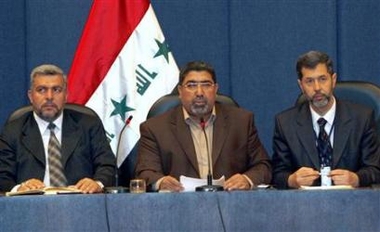PM: Govt not weakened by Sadr pullout
(Reuters)Updated: 2007-04-18 12:39
BAGHDAD - Iraqi Prime Minister Nuri al-Maliki said on Tuesday the withdrawal of ministers loyal to Shi'ite cleric Moqtada al-Sadr had not weakened his government, and he would name technocrats to replace them soon.
 Head of the Al-Sadr parliamentary bloc Nassar Al-Rubai (C) speaks during a news conference in Baghdad April 16, 2007. [Reuters]  |
"The withdrawal (of the Sadrist bloc) does not mean the government is witnessing weakness," Maliki told reporters after a cabinet session in his first public remarks on the walkout.
Sadr's ministers did not hold key portfolios. Analysts agree the biggest issue raised by their departure is whether, by distancing himself from the government, Sadr will feel less constrained to rein in his Mehdi Army Shi'ite militia.
The move could also increase pressure on Maliki to draw up a troop withdrawal timetable, a demand of many Iraqis four years after the US-led invasion. On Monday he reiterated US troops would go only when Iraqis were ready to take over security.
The Sadrists, who form the single biggest parliamentary bloc in the ruling Shi'ite Alliance, urged Maliki to appoint non-partisan independents, a suggestion he welcomed.
"In the near future, the names of the ministers will be announced ... from the independents, technocrats and those who believe in a new Iraq," Maliki said.
He said the appointment of technocrats would help the government "escape from (sectarian) quotas."
SECTARIAN BLOCS
Maliki's administration is dominated by sectarian parties drawn from the country's Shi'ite, Sunni Arab and Kurdish groups.
Iraqis have long complained that the sectarian make-up of the national unity government has forced Maliki to tread too carefully to keep his various constituencies happy, and turned ministries into the fiefdoms of political blocs.
Speaking to reporters in the Jordanian capital Amman, US Defense Secretary Robert Gates suggested Maliki might now be able to bring in replacements who "advance the reconciliation process" between Iraq's deeply divided communities.
The Shi'ite Mehdi Army has largely kept a low profile during a major US-Iraqi security crackdown in Baghdad, but there are fears it may now take to the streets again to retaliate against a recent surge in bombings blamed on the Sunni Muslim al Qaeda.
Maliki said the government was continuing its tentative contacts with insurgent groups:
"We have had many meetings with them and they have asked us not to reveal their names because it might not be in the interest of political participation."
Washington constantly presses Iraq's leaders to speed up reconciliation between majority Shi'ites and the once-dominant minority Sunni Arabs who form the backbone of the insurgency.
Senior Shi'ite lawmaker Haider al-Ibadi said Maliki would present candidates for the vacant cabinet posts, which include the health and transport ministries, to parliament by next week.
In Geneva, the Syria and Jordan and half inside Iraq.
UNHCR said up to 50,000 were fleeing their homes each month, driven out by the violence, poor services, loss of jobs and fears for the future.
|
||
|
||
|
|